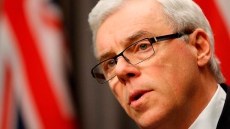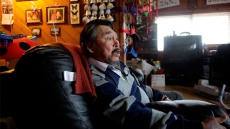MONTREAL — Mavis McArdle says she doesn't feel weird at all that a pig's liver helped save her life.
"No! It helped me live, I am alive because of that!" exclaims the 76-year-old Montreal native, who went through a pioneering medical procedure 20 years ago.
McArdle reunited Friday with her old medical team to celebrate two decades of health since the breakthrough procedure in 1994 at Montreal's Royal Victoria Hospital.
She is described by her doctors as the only person in Canada to have been kept alive using a pig's liver as life support.
In 1994, the hospital's medical team harvested a pig's organ, placed it on a pan and connected McArdle's veins to the pig liver. They pumped her blood through the pig's liver and back into her, cleaning the fluid the way a human liver would.
The Montreal procedure catalyzed research into organ transplants across North America.
The pig-liver dialysis kept McArdle alive just long enough for a new human liver to be ready.
"The doctor told me that when I got the human liver I had about 30 minutes to live," she said. "Nobody can ever know the feeling that you have when you get that organ. Somebody out there saved my life."
In 1994, McArdle fell into a coma that lasted almost eight full days after she had waited a year for a liver transplant.
Her body shut down because her liver couldn't filter blood properly.
Dr. Jean Tchervenkov, a McGill University professor who at the time was head of the transplant program at Montreal's Royal Victoria Hospital, decided to take a chance using a little-known experimental procedure he had heard about in the New England Journal of Medicine.
He decided that McArdle's best chance at surviving was using a pig's liver as a dialysis machine.
The procedure lasted about four hours.
"It was a miracle," Tchervenkov said.
McArdle needed about one hour of the pig-liver dialysis before waking up.
"Mavis opened her eyes and started looking around her," Tchervenkov said. "And as luck would have it the following day a (human) liver donor was found in Toronto."
McArdle's transplant was successful and since then she's had an — almost — healthy life.
She had a knee and hip replacement and was also diagnosed with breast cancer.
McArdle said the operation to rid her of breast cancer was "a piece of cake" compared to the liver transplant.
She said if Canadians took only one thing away from her ordeal, it would be to recycle.
"We recycle cans, and paper, why not recycle your organs? Sign your donor cards!" she said with a smile.
About 130,000 people in North America are waiting for an organ transplant, mostly for kidneys or livers.
And thanks to McArdle's procedure spurring more research into organ transplantation, Tchervenkov said McGill doctors could be transplanting pig kidneys into humans by the year 2020.
Joseph Tector, an Indiana University doctor who was part of McArdle's medical team 20 years ago, said the procedure encouraged doctors in Indiana to create a lab where they are using pigs to make their organs more compatible with a human's immune system.
"I imagine that ultimately we will be transplanting most (pig) organs into humans," he said.
But in the meantime, only human organs are compatible for transplants and that means that Canadians need to sign their organ cards, Tchervenkov said.
"Think about it," he said. "You're never too old. At McGill we just used the kidneys of an 85-year-old donor and they worked fine."





